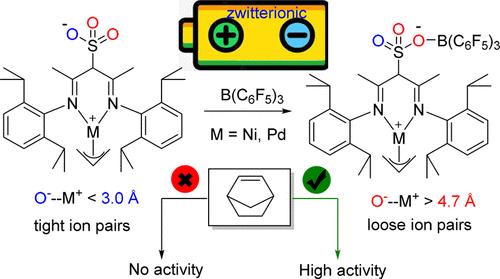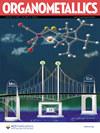Ion Pair Effects of Zwitterionic Ni/Pd Allyl Complexes Bearing an α-Sulfonate-β-diimine Ligand by Binding of B(C6F5)3 on Norbornene Polymerization
IF 2.5
3区 化学
Q2 CHEMISTRY, INORGANIC & NUCLEAR
引用次数: 0
Abstract
This paper initially reports the remote binding of B(C6F5)3 to zwitterionic nickel and palladium allyl complexes bearing an α-sulfonate-β-diimine ligand and the ion pair effects of zwitterionic complexes on norbornene polymerization. The coordination reaction of α-sulfonate-β-diimine lithium salt with η3-allyl nickel/palladium chloride dimers produces zwitterionic nickel and palladium allyl complexes (Ni-1 and Pd-1) with an uncoordinated sulfonate group and tight ion pairs (M+--O–SO2 < 3 Å, M = Ni and Pd). Zwitterionic Ni-1 and Pd-1 are inactive without any additional activators for norbornene polymerization. After activation by MAO, Pd-1 shows very high activity while Ni-1 exhibits moderate activity for norbornene polymerization. Using B(C6F5)3 as an activator, Ni-1 shows very high activity whereas Pd-1 exhibits moderate activity. The activation mechanism studies show that the binding of B(C6F5)3 to the sulfonate oxygen of zwitterionic Ni-1 and Pd-1 complexes affords the new zwitterionic complexes Ni-2 and Pd-2 with loose ion pairs (M+- - -O–B > 4.68 Å). The binding of B(C6F5)3 leads to less electrophilic metal centers and looser ion pairs. Enhanced norbornene polymerization activity using B(C6F5)3 as an activator is a result of the ion pair effects.

通过 B(C6F5)3 与降冰片烯聚合作用的结合观察含 α-磺酸盐-β-二亚胺配体的闪烁离子镍/钯烯丙基配合物的离子对效应
本文初步报告了 B(C6F5)3 与含有α-磺酸盐-β-二亚胺配体的齐聚物镍和钯烯丙基络合物的远距离结合,以及齐聚物对降冰片烯聚合的离子对效应。α-磺酸盐-β-二亚胺锂盐与η3-烯丙基氯化镍/钯二聚体的配位反应生成了具有非配位磺酸盐基团和紧密离子对(M+--O-SO2 < 3 Å,M = Ni 和 Pd)的镍和钯烯丙基聚合体(Ni-1 和 Pd-1)。在没有任何额外活化剂的情况下,双链态 Ni-1 和 Pd-1 在降冰片烯聚合过程中没有活性。经 MAO 活化后,Pd-1 表现出极高的活性,而 Ni-1 则表现出中等的降冰片烯聚合活性。使用 B(C6F5)3 作为活化剂,Ni-1 表现出极高的活性,而 Pd-1 则表现出中等活性。活化机理研究表明,B(C6F5)3 与 Ni-1 和 Pd-1 两性离子络合物的磺酸氧结合后,会产生具有松散离子对(M+- -O-B > 4.68 Å)的新两性离子络合物 Ni-2 和 Pd-2。B(C6F5)3的结合导致亲电金属中心减少和离子对松散。使用 B(C6F5)3 作为活化剂提高降冰片烯聚合活性是离子对效应的结果。
本文章由计算机程序翻译,如有差异,请以英文原文为准。
求助全文
约1分钟内获得全文
求助全文
来源期刊

Organometallics
化学-无机化学与核化学
CiteScore
5.60
自引率
7.10%
发文量
382
审稿时长
1.7 months
期刊介绍:
Organometallics is the flagship journal of organometallic chemistry and records progress in one of the most active fields of science, bridging organic and inorganic chemistry. The journal publishes Articles, Communications, Reviews, and Tutorials (instructional overviews) that depict research on the synthesis, structure, bonding, chemical reactivity, and reaction mechanisms for a variety of applications, including catalyst design and catalytic processes; main-group, transition-metal, and lanthanide and actinide metal chemistry; synthetic aspects of polymer science and materials science; and bioorganometallic chemistry.
 求助内容:
求助内容: 应助结果提醒方式:
应助结果提醒方式:


